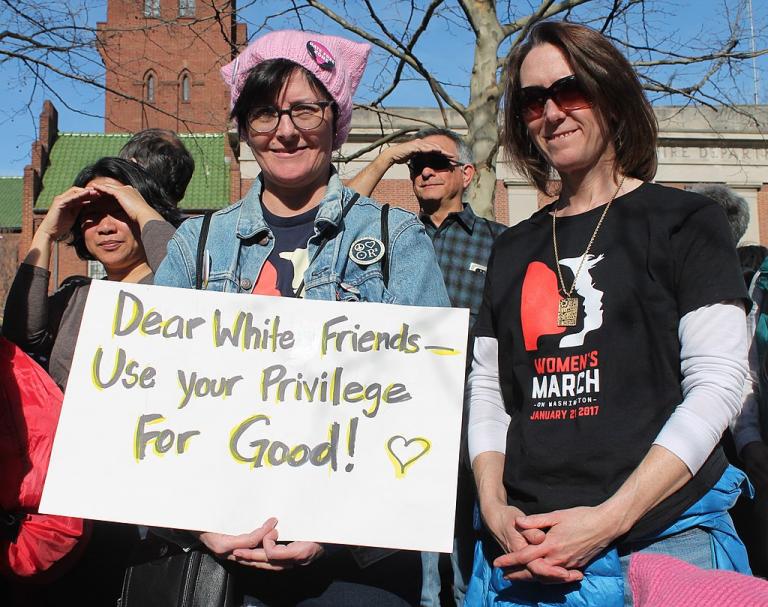We’ve blogged about the curious phenomenon of affluent college-educated white Democrats being further to the left than working class, Hispanic, and African-American Democrats. This is surprising because leftist ideology has always been about people on the bottom–workers, minorities, the “marginalized”–rising up against a system dominated by the wealthy and privileged. Yet today the wealthy and privileged who are dominating the Democratic party are more radical than the people they claim to be helping. So what does that do to today’s progressive ideology, the “critical theory” of privilege and power?
The cultural and class divide among Democrats, including the paradox of conflicting beliefs, is well-known. See David Freelander’s article in Politico, “The Democrats’ Culture Divide,” which includes this quotation from Lee Drutman of the centrist think tank New America: “Democrats have an upstairs/downstairs coalition with an affluent class that does quite well. And they are in a coalition with a poorer set of voters who don’t seem to get ahead but who are trapped in that coalition, since if they are poor African-Americans or poor Latinos they view the Republicans as a racist party.”
Several recent studies shed light on the phenomenon, as Warren Henry discusses in The Federalist. Here is an excerpt, referring to a “social and cultural values index.” (Go to the article for links to this and related studies.)
College-educated white Democrats (at -50.9) are further to the left than “Trump Republicans” are to the right (at 48.9).
They are further to the left than Democratic primary voters (at -37.1) and donors (at 44.4). And college-educated white Democrats are more than twice as far to the left as black (-24.6) or Latino (-24.3) Democrats are. Minority Democrats are much closer to the index score for non-college whites (-21). . . .
White college and Latino Democrats oppose a ban on abortion after 20 weeks, while non-college whites and blacks mildly support one. White college Dems strongly oppose requiring transgender people to use bathrooms matching their birth sex, while black Dems mildly support it. And white college Dems are the only group opposed to the death penalty for murderers.
According to the reigning progressive ideology, the “privileged” exercise their power over and thus oppress those who are “marginalized.” My question is, does this apply to privileged white progressives? I know, I know, this is where “intersectionality” comes in, as affluent whites learn to “check their privilege” and become allies with oppressed groups. But still, if power relationships are foundational to all social systems, as progressive theorists claim, it’s legitimate to ask whether the privileged leaders of the Democratic party, for all of their good intentions, are advancing their class interests in their radical politics at the expense of their marginalized constituencies.
For example, Hispanics are mostly Catholic, with a strong cohort of Pentecostals and other evangelicals. African-Americans are the most religious demographic in America, with greater belief in the Bible and higher rates of church-going–mostly evangelical Protestant–than any other classification. Of course Hispanics and Blacks will have more moral qualms about abortion than the non-religious white progressives who rule their party.
Conversely, white affluent college-educated women who are pursuing professional careers are more likely to have strongly feminist beliefs, since they are competing in a “man’s world.” Thus they are probably more likely to put a higher value on access to abortion, since an unplanned pregnancy might interfere with their career goals. Working class women, by contrast, commonly work at traditional “women’s jobs,” such as nursing, food-service, secretarial work, etc., and they often prefer single motherhood to getting an abortion, despite the financial difficulties this often entails.
Multiplying government programs likely benefits affluent professionals in academia and the “helping professions” more than working class stiffs, even if they are the ones the programs are supposed to help. Raising taxes and raising prices are not such a burden to people who can afford it. Affluent progressives are all for protecting the environment–oil executives tend to be conservative–which can directly improve their quality of life, but shutting down industries and draconian regulations can adversely impact those who need jobs. Can you think of other class interests that might be at work?
Now, having said all of this, I must make clear that since I am not a “progressive,” I do not believe that culture can be reduced to a system of group power and oppression or that people always act in their class interests.
There are all kinds of reasons why white affluent college-educated progressives might adopt radical ideologies–guilt, compassion, peer pressure, to be cool, rebellion, philosophical conviction, or a host of personal reasons.
Furthermore, people do not necessarily act on their convictions, nor do they necessarily believe in the things they do. For example, black women have proportionally more abortions than white affluent progressive women, even though black women tend not to approve of abortion, while white affluent progressive women do. And white affluent progressive women have a higher rate of marriage than working class women do, despite their respective positions on “family values.”
Here is my point: If affluent white progressives insist that they are not subject to their paradigm of power, oppression, and class interest, then neither are their opponents.
They should not accuse those who oppose abortion of supporting the patriarchy, being anti-woman, or other versions of the power/oppression construct. There are many reasons for opposing abortion, as for being politically conservative.
But if you refuse to apply your ideology to yourself, you need another ideology.
Photo: Elvert Barnes from Baltimore, Maryland, USA [CC BY-SA 2.0 (https://creativecommons.org/licenses/by-sa/2.0)] via Wikimedia Commons













